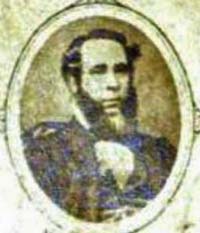THEY LIVED IN LEEDS
Wilson Armistead (1819 – 1868)
Anti-Slavery Campaigner and Writer
 There’s a unique entry in the census returns for Leeds in March 1851, for two ‘fugitive slaves’, on the run from the USA, who were staying that night with Wilson Armistead, a Leeds merchant living in Woodhouse. His household was otherwise conventional – wife, three small children, mother-in-law, three servants – but this extraordinary entry made the headlines, highlighting the shameful continued oppression and persecution of slaves in the so-called ‘land of the free’. Here was the cause to which Wilson Armistead was to devote his life and energies. His campaigning work put Leeds at the forefront of the abolition movement.
There’s a unique entry in the census returns for Leeds in March 1851, for two ‘fugitive slaves’, on the run from the USA, who were staying that night with Wilson Armistead, a Leeds merchant living in Woodhouse. His household was otherwise conventional – wife, three small children, mother-in-law, three servants – but this extraordinary entry made the headlines, highlighting the shameful continued oppression and persecution of slaves in the so-called ‘land of the free’. Here was the cause to which Wilson Armistead was to devote his life and energies. His campaigning work put Leeds at the forefront of the abolition movement.
What motivated him? He was a Quaker, born at Water Lodge close to the Quaker settlement in Water Lane, south of the river. His father Joseph was partner in a family business there, making mustard and brushes, and dealing in seed and oils, which Wilson later took over. From childhood he was devout, thoughtful, a fervent follower of traditional Quaker beliefs in equality and justice, particularly on behalf of the black slaves of America. He contacted and exchanged ideas with the leaders of the anti-slavery movement here and in the US and began writing a series of memoirs of outstanding former slaves and their achievements.
He knew the power of the written word to persuade and influence, and collected material and support for a major work, published in 1848 when he was barely 30: A Tribute for the Negro: A vindication of the moral, intellectual and religious capabilities of the coloured portion of mankind with particular reference to the African race. It ran to over 560 pages, part argument and testimonials, part biographical, telling the emotive stories of former slaves, their achievements and their sufferings. Almost a thousand people subscribed to its publication, including Queen Victoria.
In 1850 he visited America to get first-hand experience of conditions and meet the leaders of the abolition movement. He saw the impact of the new Fugitive Slave Act, which ferociously punished escaping slaves and anyone sheltering them. He heard the moving story of William and Ellen Craft’s desperate thousand-mile escape from cruel slavery: she (pale-skinned) dressed as a man, he as her servant. When they fled to Britain they told their story at public meetings around the country, including in Leeds where they stayed in Wilson Armistead’s home on that census night. They impressed their audiences with their dignity and eloquence.
Wilson Armistead’s numerous writings won powerful support, moral and financial, for his abolitionist crusade. In 1853 he set up and was the first president of the Leeds Antislavery Association. He invited eminent speakers to Leeds and was encouraged by visits from distinguished abolitionists like Harriet Beecher Stowe, author of the influential best-seller Uncle Tom’s Cabin. In line with his beliefs the Association ran on egalitarian principles, with women playing an equal part in its running, including his wife. Its emblem was distinctive, matching the familiar motto ‘Am I not a Man and a Brother?’ with ‘Am I not a Woman and a Sister?’.
In 1853 he also began the publication of a series of 82 anti-slavery tracts, from 1 to 28 pages long, published as separate pamphlets and also collected into one volume. Over half a million tracts sold in the first months. They told dramatic personal stories of slavery, sometimes blood-curdling, sometimes involving children, illustrated with vivid engravings – persuasive material. He followed this up with further articles in the Association’s Journal and several more anti-slavery publications. He saw the Civil War finally bring slavery in the US to an end, but he continued untiringly to support the freed slaves, who were often destitute, and to battle racial prejudice. Amazingly he still found time to write on natural history subjects, and on religious themes. His religious faith and ideals underlay everything he did.
His health suffered, as perhaps did his rather neglected business. Fortunately, his wife, Mary Bragg, shared his Quaker faith and supported his activities, while looking after their five children. They lived mostly in Little Woodhouse, in later years in Beech Grove Terrace then from around 1865 in his father’s house ‘Virginia Cottage’ (now part of Lyddon Hall on the Leeds University campus) – ironically the name refers to the state of Virginia where slave labour provided the tobacco which enriched the original owner, a Leeds tobacco merchant. There Wilson Armistead died suddenly in 1868, aged only 49. He was remembered as a retiring, dedicated, generous man, with a deeply sympathetic heart for suffering and distress wherever it was found.
His Tribute to the Negro is still studied and his words strike home now just as powerfully as when he wrote them.
Eveleigh Bradford
April 2020